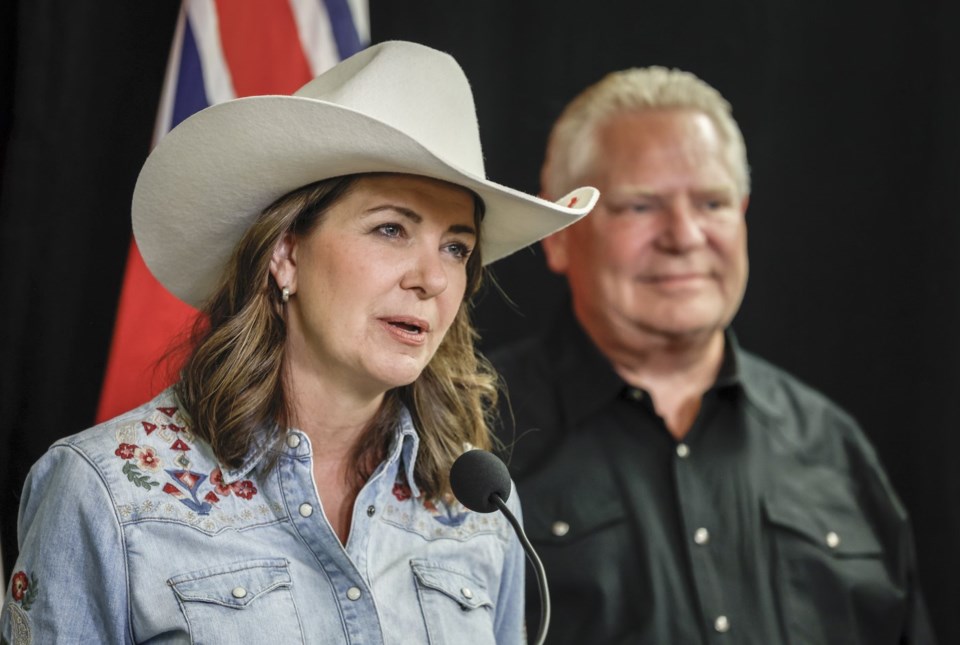CALGARY — Alberta plans to hold public consultations this fall on adding nuclear power to the province's energy mix, Premier Danielle Smith said Monday.
There have long been discussions about building reactors in Alberta — including ones that could power oilsands operations — but the province is currently reliant on greenhouse-gas emitting natural gas for electricity.
Those conversations are to begin anew around September or October, when Chantelle de Jonge, parliamentary secretary for affordability and utilities, plans to hold nuclear consultation sessions.
"We want to talk to Albertans, because it's new for us," Smith told reporters alongside Ontario Premier Doug Ford after the two flipped pancakes at the Alberta premier's annual Stampede breakfast.
"It's not new for Ontario. Ontario gets 60 per cent of their power, I understand, on their grid from nuclear energy."
Small modular reactors probably make the most sense at remote rural sites that are heavy energy users, the premier added.
"Our oilsands projects are perfect for it, if you can get both the power and steam, power and heat."
Small modular reactors, or SMRs, generate about one-third of the power of traditional nuclear plants and can be prefabricated elsewhere before being shipped to site.
Ontario Power Generation is building an SMR at its Darlington site east of Toronto, which would make it the first power company in North America to connect such a plant to the grid. There are plans to build three more SMR units there.
Ford said SMRs don't themselves employ a lot of people when they're up and running, but they could enable tech giants like Amazon or Google to set up shop with electricity-hungry artificial intelligence data centres.
"And that's where the jobs are created because they just suck an endless amount of energy, these data centres," Ford told reporters.
"So that's the way of the future. We're leading the world and we're gonna make sure we share that technology right across the country."
At least one U.S. developer of small modular rectors has a keen eye on Alberta as a growth market.
"We have designed a small modular reactor that is perfectly suited for Alberta," Clay Sell, CEO of X-Energy Reactor Co., said in an interview last month.
The problem with conventional reactors has been their complexity, he said on the sidelines of the Global Energy Show in Calgary.
"If you ever get one built, you'll run it for the next 80 years, but they're hard to build and they're capital intensive to build," Sell said.
"So our whole approach has been from the beginning: 'How do we make it simpler? How do we make it smaller? How do we have fewer components?'"
X-Energy is pursuing opportunities to add power to Alberta's grid in general, as well as to link to steam-assisted gravity drainage oilsands projects that pull bitumen from deep underground through wells rather than mine it.
"Our plant is perfectly suited to perform that same mission on a small footprint," Sell said.
OPG is looking at using X-Energy plants at industrial sites in Ontario.
A much larger conventional plant is also in the works in northwestern Alberta.
Energy Alberta is working on a power station in the Peace River area that would have two to four Candu reactors and a capacity of up to 4,800 megawatts. That would represent up to a quarter of the province's existing electricity generation.
"We initially thought, 'wow, that would swamp our power grid,'" Smith said.
"And now with all the demands for AI data centres, we're thinking, 'hmm, that's maybe exactly what we need.'"
An initial project description was filed in April for the Peace River Nuclear Power Project, kicking off the federal review process.
In a speech to the Global Energy Show in June, Candu Energy senior vice-president Carl Marcotte said Alberta would benefit from adding nuclear to the mix.
"Whatever Albertans decide to build, you will. But you need a lot more power to do it — reliable power that runs 24/7, power that works in great weather and when it's -45 C... and it must be affordable — it really must," he said.
"So yes, of course Alberta's abundant natural gas resources can and should do all that...But wouldn't it benefit from having a powerful, cleaner, reliable ally in that growth, providing important baseload electricity with low emissions?"
This report by The Canadian Press was first published July 7, 2025.
Lauren Krugel, The Canadian Press



